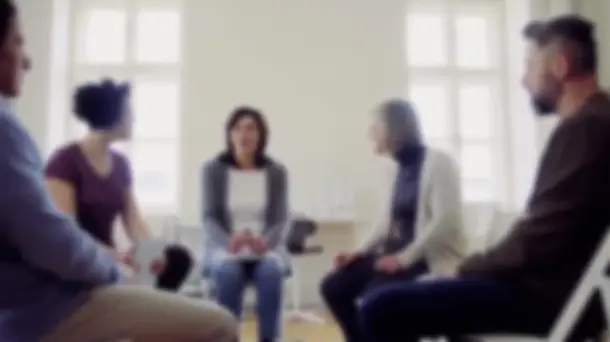Welcome to Narcotics Anonymous
What is our message? The message is that an addict, any addict, can stop using drugs, lose the desire to use, and find a new way to live. Our message is hope and the promise of freedom.

“When new members come to meetings, our sole interest is in their desire for freedom from active addiction and how we can be of help.”
It Works: How and Why, “Third Tradition”
Is NA for me?
This is a question every potential member must answer for themselves. Here are some recommended resources that may be helpful:
Need help for family or a friend?
NA meetings are run by and for addicts. If you're looking for help for a loved one, you can contact Narcotics Anonymous near you.
Subscribe to NAWS Emails
Sign up to receive Just for Today and SPAD daily meditation emails, as well as NAWS News, NAWS Updates, and more.
Never before have so many clean addicts, of their own choice and in free society, been able to meet where they please, to maintain their recovery in complete creative freedom.
Basic Text, “We Do Recover”
Recovery Quicklinks:
Service Quicklinks:
Narcotics Anonymous sprang from the Alcoholics Anonymous Program of the late 1940s, with meetings first emerging in the Los Angeles area of California, USA, in the early Fifties. The NA program started as a small US movement that has grown into one of the world's oldest and largest organizations of its type.
Today, Narcotics Anonymous is well established throughout much of the Americas, Western Europe, Australia, and New Zealand. Newly formed groups and NA communities are now scattered throughout the Indian subcontinent, Africa, East Asia, the Middle East, and Eastern Europe. Narcotics Anonymous books and information pamphlets are currently available in 49 languages.
Information About NA
Daily Meditations
Just for Today
September 22, 2025 |
Keeping the gift |
| Page 276 |
| “Life takes on a new meaning when we open ourselves to this gift.“ |
| Basic Text, p. 107 |
| Neglecting our recovery is like neglecting any other gift we've been given. Suppose someone gave you a new car. Would you let it sit in the driveway until the tires rotted? Would you just drive it, ignoring routine maintenance, until it expired on the road? Of course not! You would go to great lengths to maintain the condition of such a valuable gift. Recovery is also a gift, and we have to care for it if we want to keep it. While our recovery doesn't come with an extended warranty, there is a routine maintenance schedule. This maintenance includes regular meeting attendance and various forms of service. We'll have to do some daily cleaning–our Tenth Step–and, once in a while, a major Fourth Step overhaul will be required. But if we maintain the gift of recovery, thanking the Giver each day, it will continue. The gift of recovery is one that grows with the giving. Unless we give it away, we can't keep it. But in sharing our recovery with others, we come to value it all the more. |
| Just for Today: My recovery is a gift, and I want to keep it. I'll do the required maintenance, and I'll share my recovery with others. |
A Spiritual Principle a Day
September 22, 2025 |
The Value of Empathy |
| Page 274 |
| “Empathy means we get each other; we see the hidden darkness and love and hurt, and we understand.“ |
| Living Clean, Chapter 5, “Fellowship” |
| As newcomers, we often were suspicious when NA members told us “I get you” after we shared. When someone said, “I've been there,” we thought, No way anyone has been through what I've been through. Even scarier is when someone says, “I see you.” If someone can see me, then they know how horrible I am. A lot of us reject empathy at first because we misinterpret it as sympathy, like someone feeling sorry for us. What we begin to understand, as we keep coming back, is that our fellow NA members are feeling our pain with us. We get each other. Our situations and experiences may be different, even unique, but our suffering is not. All of us came to our first NA meeting having fought to keep our addiction going and having lost that fight. Over time, the value of empathy is revealed. After we surrender to the fact that we belong in NA, it is others' empathy that makes us feel safe enough to accept help. We learn we don't have to hide–we can remove the mask we've been wearing, whether it's one projecting intimidation, righteousness, innocence, or invisibility. We can allow ourselves to be seen below the surface and accept that others do understand us. And in turn, we start to identify and empathize with other addicts in the room. Being understood can be scary in a different way, too, because we witness people who've been through situations similar to ours who have taken positive action. They are clean and are taking responsibility for their lives, their relationships, and their choices. Allowing their empathy to affect us helps us to let go of the depth of our hurt and to see a path forward. Eventually, we feel grateful that we get to do that. Accepting others' empathy brings relief. Although we get each other's darkness and hurt, we also feel each other's love and joy. We certainly do get each other, and it's based not only on our wreckage but on how we deal with it. Let's acknowledge that, too. |
| ——— ——— ——— ——— ——— |
| I acknowledge that feeling seen and understood has helped me to heal. That's why today I'm going to be open to other addicts identifying with me and relating to them. I know I'm not alone. |
Do you need help with a drug problem?
“If you’re new to NA or planning to go to a Narcotics Anonymous meeting for the first time, it might be nice to know a little bit about what happens in our meetings. The information here is meant to give you an understanding of what we do when we come together to share recovery…”
Subscribe to NAWS Emails
Sign up to receive NAWS Updates and NAWS News emails as well as Just for Today and SPAD daily emails.



